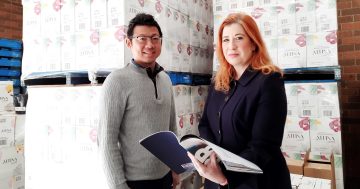
Business and Better Regulation Minister Tara Cheyne: politics trumps a reasonable idea. Photo: Dominic Giannini.
Canberra is no longer talked about as a company town, despite government still being a big direct and indirect employer. The private sector is growing and evolving to provide more of the diversified economic base that governments have been talking about for years.
The great majority of those businesses are small, employing one to 20 people, and some hopefully will not stay small but blossom into bigger enterprises with commensurate payrolls.
Some Canberra start-ups have already progressed to making their marks on the national and even global scene, particularly in the technology sector.
This is great news for the local Canberra economy, intertwined as it will be with government.
So it is a pity that new Business Minister Tara Cheyne’s political reflex was to rebuff the Canberra Liberals’ reasonable push for small business to have its own Ministerial Advisory Council to have input and dialogue with the government about the decisions and policies that affect it.
Unlike the many other sectors that do have their own MACs and find them useful tools for being in the loop and giving the government ideas and feedback, somehow Ms Cheyne believes small business is too wide and varied a sector to be adequately represented and that many operators would simply not have the time to commit to such an enterprise and would find it a burden.
She prefers direct dialogue rather than having to deal with a group of small business reps.
That sounds like finding excuses not to give her political opponents a win rather than solid reasons for at least not giving the idea a go.
Liberal Peter Cain called it ludicrous, and the woman who proposed the original Legislative Assembly motion, business spokesperson Leanne Castley, was disappointed and staggered to hear Ms Cheyne’s comments.
Canberra Business Chamber CEO Graham Catt was, not surprisingly, on board with the idea, saying the more diversity of views the government was exposed to, the better, noting the huge role small business has in employing Canberrans.
The move also comes as the economy continues to recover from the impacts of the pandemic, and while Canberra has been to some degree insulated from its worst effects, anything that would enhance a full recovery, and help those small businesses survive and grow, would be beneficial.
Mr Catt says everybody shares a common goal for small business to succeed, so Ms Cheyne’s response seems a little petty, considering Labor has long criticised the opposition for being negative.
The government has supported small business during the pandemic, but it hasn’t exactly endeared itself to small business in the area of commercial rates and other charges.
A MAC would give small business more of a voice that could be heard by government and narrow whatever the perceived distance is between it and the government.
Canberra is growing into a city and has made great strides in developing its own business culture and ecosystem, but it is still early days.
While the market is the final arbiter of success, a solid partnership between small business and government will go a long way to helping more start-ups and enterprises flourish and add to a deeper and richer private sector, which in the end will make the ACT Government’s job easier to fund services and keep its books in order.
The worst that can happen is that a small business MAC didn’t fulfil its potential. But it would be worth a shot to put politics aside and give it a go.





















